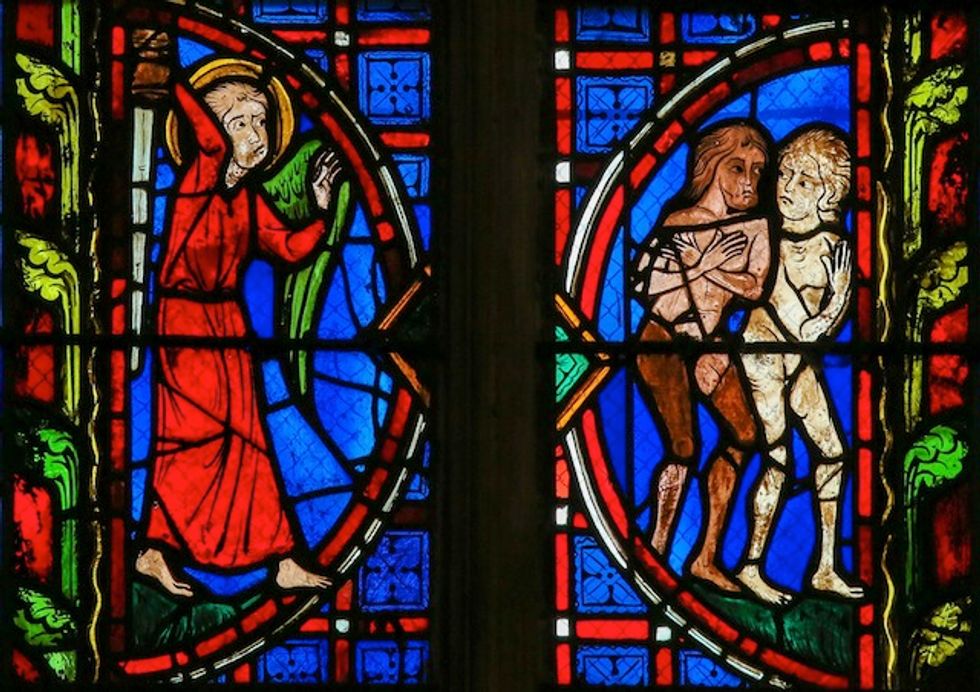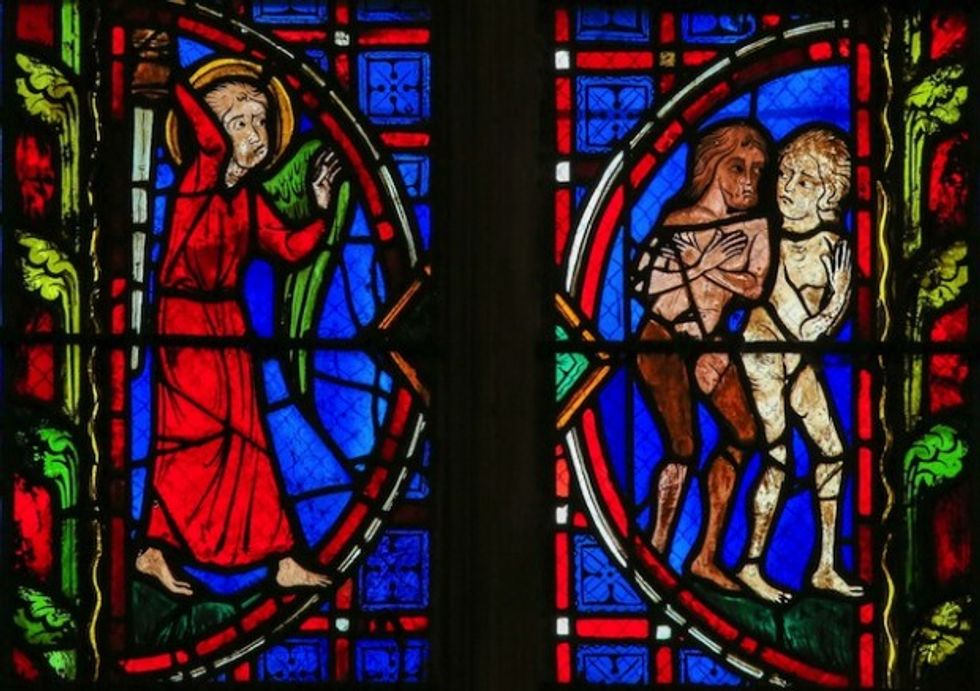
Stained glass window depicting Adam and Eve expelled from Garden of Eden in the Cathedral of Tours, France (Photo: Shutterstock/Jorisvo)

A professor of the Bible in California has posed the theory that the Adam and Eve narrative in the book of Genesis was mistranslated and that Eve was created not out of Adam’s rib, but his baculum, or penis bone.
Ziony Zevit, a professor of biblical literature and Northwest Semitic languages at American Jewish University in California, recently presented his argument in an article in Biblical Archaeology Review based both on what he believes to be an erroneous translation for the Hebrew word for “rib” and also on the unique anatomy of the human male, one of the few mammals lacking a baculum.
He also pointed to the fact that men and women have the same number of ribs and that men have an even number of ribs, suggesting none are missing.

Zevit wrote that the translation of the Hebrew word “tsela” as “rib” was incorrect. In fact, leading Jewish Torah scholars have for centuries have been debating the meaning of the Hebrew word.
In a cover story in Biblical Archaeology Review, “Was Eve Made from Adam’s Rib—or His Baculum?,” Zevit argued that “tsela” appears 40 times in the Old Testament, but it was translated as “rib” only in the Adam and Eve context.
Elsewhere it was translated as “side,” referring to an object protruding from the main body.
“This Hebrew word occurs some 40 times in the Hebrew Bible, where it refers to the side of a building or of an altar or ark (Exodus 25:12; 26:20, 26; 1 Kings 6:34), a side-chamber (1 Kings 6:8; Ezekiel 41:6), or a branch of a mountain (2 Samuel 16:13),” Zevit wrote.
“In each of these instances, it refers to something off-center, lateral to a main structure. The only place where tsela might be construed as referring to a rib that branches off from the spinal cord is in Genesis 2:21–22,” he wrote.
Zevit believes “tsela” refers to “limbs lateral to the vertical axis of an erect human body: hands, feet, or, in the case of males, the penis.”
And the only one of those limbs lacking a bone is the penis. Eve’s creation from the penis bone could offer one explanation as to why humans differ from many other mammals in lacking the baculum, Zevit wrote.
In a 2007 article on the Union of Orthodox Rabbis website, Rabbi Dr. Ari Zivotofsky of Israel’s Bar-Ilan University cited arguments from ancient and medieval Jewish scholars who also tried to determine if Eve was fashioned out of Adam’s rib, side or tail.
However, an article Tuesday in the Israeli Ha’aretz newspaper by contributor Elon Gilad cast doubt on Zevit’s mistranslation argument, citing other Semitic languages:
Not only is tzela "rib" in post-biblical Hebrew, it has cognates meaning rib in practically every Semitic language we know. That powerfully indicates that tzela meant “rib” thousands and thousands of years before proto-Semitic split up into the different Semitic languages: Aramaic has ala, Arabic has dhala, Akkadian has tzela. All these and other cognates are exactly in the form we would expect if the original proto-Semitic word slowly morphed into different words for rib as the different Semitic languages drifted apart.
Gilad pointed out that Genesis 2:21 specifically notes that “one of his ribs” was taken, suggesting it was an object of which Adam had many, and he observed, “For one, studying the verse in question, it is clear that God is taking something from Adam of which he has many: ‘And the LORD God caused a deep sleep to fall upon Adam, and he slept: and he took one of his ribs, and closed up the flesh instead thereof’ (Genesis 2:21).”
The word was first translated to “rib” in the third century B.C. Greek translation of the Bible from Hebrew, known as the Septuagint. The Septuagint translated the Hebrew “tsela” to the Greek word “pleura,” which means the "side of the body." That could mean that the word may have been mistranslated from Greek, not Hebrew.